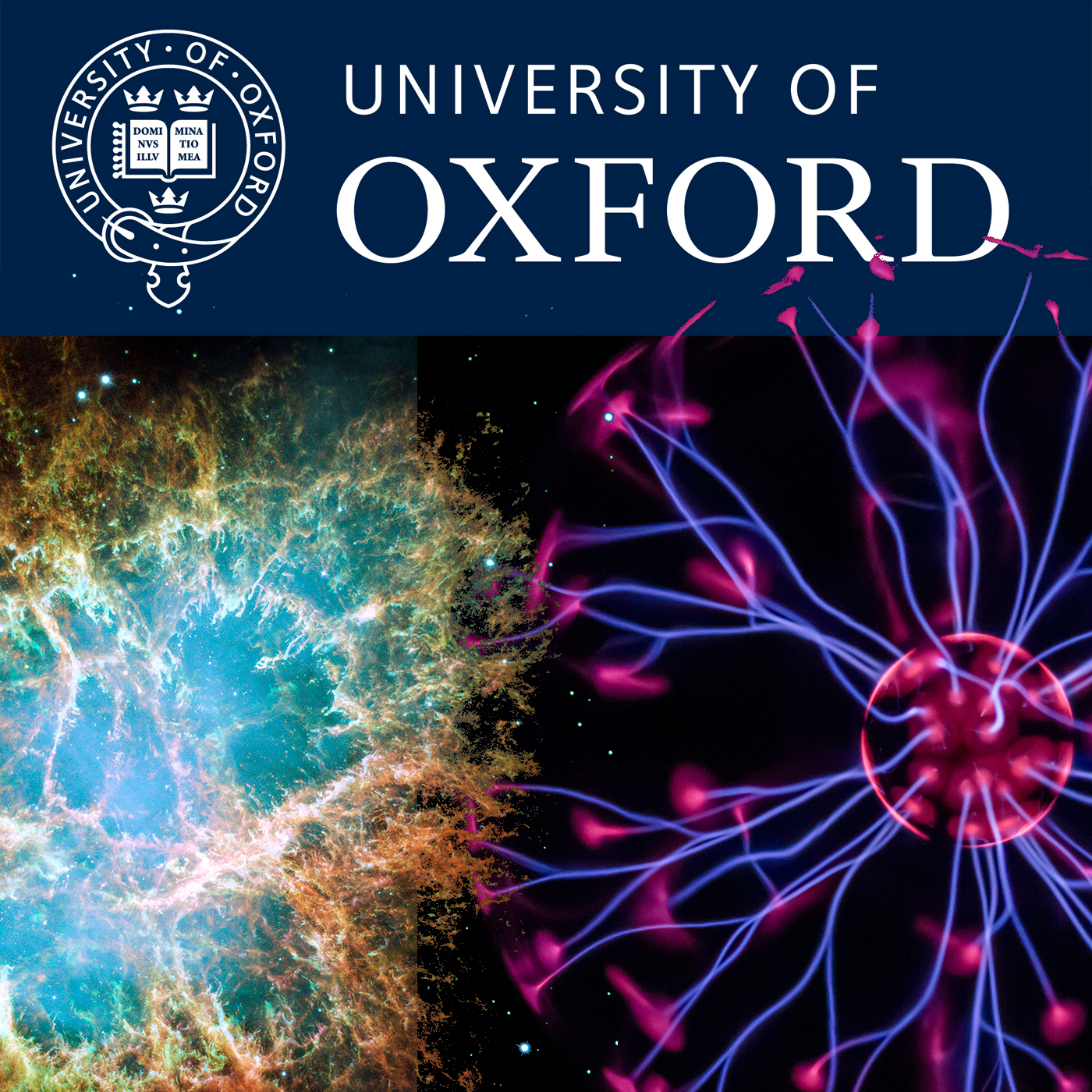

Theoretical Physics - From Outer Space to Plasma
Oxford University
Learn about quantum mechanics, black holes, dark matter, plasma, particle accelerators, the Large Hadron Collider and other key Theoretical Physics topics. The Rudolf Peierls Centre for Theoretical Physics holds morning sessions consisting of three talks, pitched to explain an area of our research to an audience familiar with physics at about second-year undergraduate level.
Episodes
Mentioned books

May 10, 2017 • 43min
The birth of gravitational wave astronomy
Subir Sarkar reviews the detection of the ‘chirrup’ signal from a pair of merging massive black holes by the Laser Interferometer Gravitational-Wave Observatory, as well as subsequent experimental developments.

May 10, 2017 • 47min
From action at a distance to gravitational waves
James Binney gives a talk about the mathematics that describe Gravitational waves.

Feb 28, 2017 • 46min
Kilometres: Turbulence - Morning of Theroetical Physics
Fasten Your Seat Belts: Turbulent Flows in Nature. Turbulence is ubiquitous in nature, and it often causes us headaches both literal and metaphorical. From unpredictable weather to the mixing of milk in our coffee, Michael Barnes will talk about how turbulence arises and our ongoing struggle to control it.

Feb 28, 2017 • 39min
Microns: The bacterial viewpoint - Morning of Theroetical Physics
Ramin Golestanian will introduce you to Life at Low Reynolds number and ask how microorganisms can swim, navigate, and coordinate their activities. You will discover how the left-right symmetry is first broken in a developing embryo, and investigate the medically important question of how mucus is shifted in our lungs and what happens when things go wrong.

Feb 28, 2017 • 47min
Centimetres: Fluids all around us - Morning of Theroetical Physics
Julia Yeomans will talk about fluids and flows all around us: from superhydrophobic surfaces and how animals and plants keep dry, to bouncing droplets and balloons.

Nov 1, 2016 • 36min
Topology and the Classification of Matter: New Physics Hidden in Plain Sight
Third lecture "More is different" - how states of matter emerge from quantum theory Saturday morning of Theoretical Physics. With Professor Steve Simon, introduction by Professor John WheelerThird Steve Simon will focus on the recent realization that Landau’s classification, thought to be complete for most of the twentieth century, in fact misses some of the most exciting, yet subtle, physics. The new missing ingredient is naturally cast in the language of the mathematical field of topology, giving rise to a host of what we now call topological states of matter. In particular, we have now realized that fundamentally new types of electronic materials exist --- some of which, in fact, have been hiding under our noses for decades!
More on this mini-series;
The properties of all forms of matter, from the most mundane to the most exotic kinds produced in advanced laboratories, are consequences of the laws of quantum mechanics. Understanding how macroscopic behaviour emerges from microscopic laws in a system of many particles is one of the intellectually most demanding, yet most important, challenges of physics, and is the subject of this series of lectures.

Nov 1, 2016 • 47min
Magnets, superfluids and superconductors
Second lecture "More is different" - how states of matter emerge from quantum theory Saturday morning of Theoretical Physics. With Professor Fabian Essler, introduction by Professor John Wheeler. Fabian Essler will discuss the hugely successful framework for classifying possible states of quantum matter, pioneered by the great Russian Nobel Laureate, Lev Landau. This framework is conceptually remarkably simple, but is broad enough to describe physics ranging from magnets to superconductors to fundamental physics in the guise of relativistic quantum field theory and the Higgs phenomenon.
More on this mini-series;
The properties of all forms of matter, from the most mundane to the most exotic kinds produced in advanced laboratories, are consequences of the laws of quantum mechanics. Understanding how macroscopic behaviour emerges from microscopic laws in a system of many particles is one of the intellectually most demanding, yet most important, challenges of physics, and is the subject of this series of lectures.

Nov 1, 2016 • 44min
Identical particles: from one to many
First lecture in the "More is different" - how states of matter emerge from quantum theory Saturday morning of Theoretical Physics. With Professor John Chalker, introduction by Professor John Wheeler. John Chalker will review the quantum mechanics of identical particles which forms the foundation for our understanding of why diamond is transparent and why gold conducts electricity. He will also explain how we can control the motion of electrons in certain devices to make resistances quantised with an accuracy of a few parts in a billion.
More on this mini-series;
The properties of all forms of matter, from the most mundane to the most exotic kinds produced in advanced laboratories, are consequences of the laws of quantum mechanics. Understanding how macroscopic behaviour emerges from microscopic laws in a system of many particles is one of the intellectually most demanding, yet most important, challenges of physics, and is the subject of this series of lectures.

May 24, 2016 • 47min
String Theory, Holography and Quark-Gluon Plasma
Members of the Rudolf Peierls Centre for Theoretical Physics hosted the ninth Saturday Morning of Theoretical Physics on 21st May 2016. Talk 3 by Dr Andrei Starinets.

May 24, 2016 • 44min
String Theory and Particle Physics
Members of the Rudolf Peierls Centre for Theoretical Physics hosted the ninth Saturday Morning of Theoretical Physics on 21st May 2016. Talk 2 by Professor Andre Lukas.


